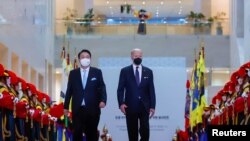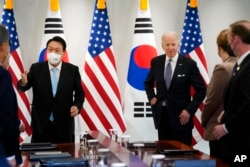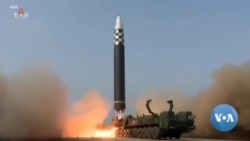U.S. President Joe Biden and South Korean President Yoon Suk Yeol have signaled a stronger military posture amid a series of recent North Korean missile test launches and a potential nuclear test.
“Today, President Yoon and I committed to strengthening our close engagement and work together to take on challenges of regional security, including addressing the threat posed by the Democratic People's Republic of Korea by further strengthening our deterrence posture and working towards complete denuclearization of the Korean Peninsula,” said Biden Saturday at a joint press conference in Seoul, on the first leg of his six-day trip to South Korea and Japan.
“President Biden affirmed the ironclad U.S. commitment to the defense of the Republic of Korea and substantive extended deterrence,” Yoon said through an interpreter. Extended deterrence is a term that indicates the U.S. will use its full range of military capabilities, including nuclear, conventional and missile defense in defending its allies.
According to a joint statement released following the summit, the leaders agreed to begin discussions “to expand the scope and scale of combined military exercises and training on and around the Korean Peninsula” and committed to “identify new or additional steps to reinforce deterrence” amid North Korea’s “destabilizing activities.”
Military exercises between the allies were scaled back during the pandemic and as part of efforts to engage North Korean leader Kim Jong Un by the previous administrations of Donald Trump and Moon Jae-in.
Yet North Korea continues its weapons programs, with 16 missile tests this year, including its first test of an intercontinental ballistic missile in more than four years in March. U.S. officials have warned that Pyongyang may conduct additional missile or even nuclear tests while Biden is in Asia.
North Korean outbreak
Both leaders expressed concern over the current COVID-19 outbreak in North Korea and said they are willing to work with the international community to help Pyongyang combat the virus.
After confirming its first case of COVID-19 last week, North Korean state media Saturday reported about 220,000 new cases of an unidentified “fever” and said 66 people had died.
Experts fear the number of cases is much higher and that the outbreak would be disastrous for a country suffering from food shortages and having poor medical infrastructure. Pyongyang has not inoculated its population and has turned down vaccine donation offers from the U.N. COVAX program.
The aid offer is unlikely to be accepted, said Bong Young-shik, a lecturer at Seoul’s Yonsei University.
“By accepting external assistance, especially from South Korea and the United States, the principle of the infallibility of the supreme leadership will be greatly damaged,” he told VOA.
A senior administration official told reporters in a phone briefing that the U.S. is in discussions with China to look for ways to help North Korea as it deals with the outbreak.
Strengthening supply chain
Upon landing at the U.S. Air Force’s Osan Air Base in Pyeongtaek, around 55 kilometers south of Seoul, Friday, Biden began immediately with a tour of the nearby Samsung Pyeongtaek Campus, the largest semiconductor plant in the world. The factory is a model for a $17 billion computer chip facility Samsung is building outside Austin, Texas.
In remarks following a tour of the plant showcasing the electronics company's new 3-nanometer chips, Biden called the U.S-South Korea alliance “a lynchpin of peace, stability, and prosperity.” He and Yoon vowed to work together to strengthen supply chains of semiconductors and other critical components. There is currently a global shortage of chips – used in various electronic consumer goods and automobiles – aggravated by the pandemic.
Washington and Seoul are among each other’s largest trading and investment partners, with more than $62 billion of foreign direct investment by South Korean firms in the United States as of 2020.
During their meeting Saturday, the leaders discussed a broader range of issues including the Indo-Pacific Economic Framework.
The IPEF – scheduled to be launched Monday in Tokyo – is the centerpiece of U.S. economic policy in the region since the Trump administration’s 2017 withdrawal from the Trans-Pacific Partnership, the free trade agreement the Obama administration launched in 2016.
While Seoul is unlikely to downgrade economic ties with Beijing, its support for the IPEF, the administration’s economic counteroffensive against China, is crucial.
“No one in Korea is talking about the economic isolation of China, that’s really not going to happen,” Ramon Pacheco Pardo, a Korea specialist at King’s College London told VOA. Yoon, though, will be “much more vocal in making clear that Korea is joining these frameworks that we all know are anti-China,” he said.
It is still unclear whether Seoul will sign on to the IPEF. The leaders’ statement only stated that the two agreed “to work together to develop a comprehensive IPEF that will deepen economic engagement on priority issues.”
The IPEF, has been criticized for its lack of market access provisions, making it less attractive than existing regional free trade agreements such as the Comprehensive and Progressive Agreement for Trans-Pacific Partnership and the Regional Comprehensive Economic Partnership.
Even without the promise of increased market access, administration officials said they expect a significant number of countries to sign on.
“I think you're going to see a really impressive display of energy and enthusiasm by a significant number of countries in the Indo-Pacific for the launch of the Indo-Pacific Economic Framework,” White House national security adviser Jake Sullivan said in response to a question from VOA.
“It is going to be a wide-ranging and comprehensive set of countries from across the region, a mix of different kinds of economies. And that diversity and breadth of participation, in our view, actually vindicates the basic theory behind IPEF, which is — you're right — it is not a traditional free trade agreement. And that's a good thing. It is a modern negotiation designed to deal with modern challenges.”
“We think this event on Monday is going to be a big deal and is going to be a significant milestone in U.S. engagement in the Indo-Pacific,” Sullivan said. “And at the end of the President's first term, I think we will look back and say this was a moment where the U.S. engagement in the Indo-Pacific got kicked into a different gear.”
China military flex
In Asia, Biden will reaffirm U.S. commitment to a free and open Indo-Pacific and use the Ukraine crisis to signal that unilateral change to the status quo by force – whether in Taiwan or the disputed islands in the South China Sea – is unacceptable.
However, there is little likelihood that Beijing might opportunistically move against Taiwan while the U.S. is focused on the Russian invasion, said Robert Daly, director of the Wilson Center's Kissinger Institute on China and the United State. The enormous economic pressures brought on by the zero-COVID policy has led to growing public skepticism about the Chinese leadership.
(Chinese leader) “Xi Jinping faces strong domestic headwinds, he can't face another failure,” Daly told VOA.
Still Xi is flexing his military prowess. Ahead of Biden’s arrival in Seoul Thursday, China announced it is holding military exercises in the disputed South China Sea. Beijing has militarized at least three of several islands it artificially built in the strategic waters, an aggressive move that concerns the U.S. and its allies.
Yoon will host Biden for a state dinner later Saturday. On Sunday Biden will meet South Korean business leaders before continuing his trip to Tokyo.
William Gallo contributed to this report










